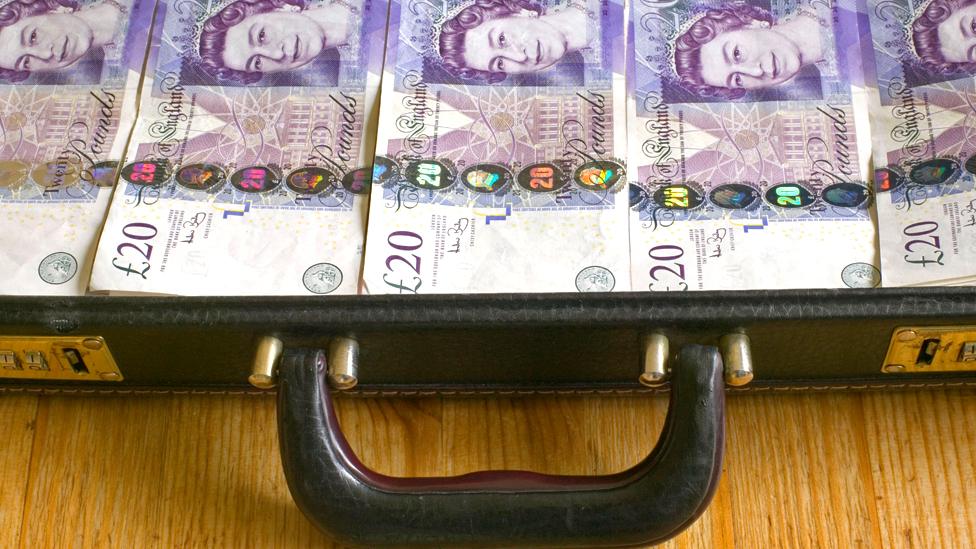Ukraine conflict: UK sanctions Belarus for role in Russian invasion
- Published
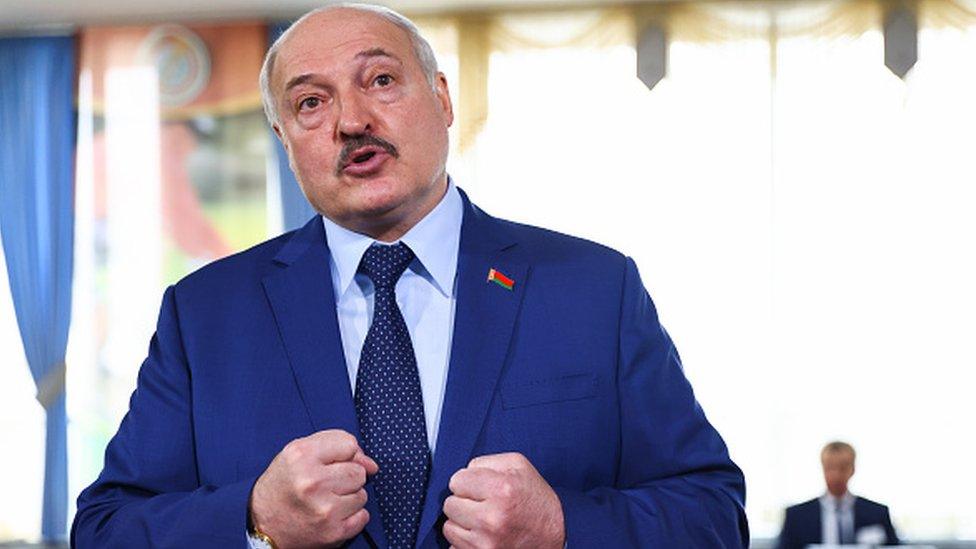
Belarus leader Alexander Lukashenko is a close ally of Russian President Vladimir Putin
The UK has targeted Belarusian army chiefs as part of its first wave of sanctions against Belarus for its role in Russia's invasion of Ukraine.
Four defence officials and two military enterprises are included in the package.
Foreign Secretary Liz Truss said Belarus leader Alexander Lukashenko had aided and abetted Russia's invasion.
Mr Lukashenko has hosted Russian forces and allowed them to use Belarus as a staging ground.
A close ally of Russian President Vladimir Putin, Mr Lukashenko's administration has become increasingly reliant on Russia for economic, political and military support in recent years.
Mr Putin backed Mr Lukashenko after he claimed a disputed election victory in 2020, sparking mass protests that almost ousted him from power.
In January this year, Belarus hosted large joint military drills with Russia as western leaders issued increasingly grave warnings of a possible attack on Ukraine.
The exercises were extended and then Belarus announced that the Russian troops would remain in the country, citing "the aggravation of the situation" in eastern Ukraine.
But on Monday, Mr Lukashenko said Belarus had no plans to join Russia's military operation in Ukraine, according to state news agency Belta.
Mr Lukashenko denied Ukraine's allegations that Russian troops were attacking from Belarus's territory, Belta's report said.
Announcing sanctions on Tuesday, external, the UK government accused Belarus of "facilitating the invasion from within its borders".
Those sanctioned include:
Belarus's deputy defence minister, Major General Victor Gulevich, who is "responsible for directing the actions of the Belarusian armed forces"
Major General Andrei Burdyko, a logistics chief; Major General Sergei Simonenko, an arms chief; and Major General Andrey Zhuk, Belarus's deputy minister of defence
Also sanctioned are JSC Integral, a military semi-conductor manufacturer, and JSC 558 Aircraft Repair Plant, which provides maintenance and servicing to military aircraft at an air base from which Russian aircraft have operated
Ms Truss said Belarus "will be made to feel the economic consequences for its support for Putin".
"We are inflicting economic pain on Putin and those closest to him. We will not rest until Ukraine's sovereignty and territorial integrity is restored."
The UK says it has already imposed sanctions on more than 100 people and organisations in response to the "fraudulent elections" and "human rights violations" in Belarus.
Suggesting further sanctions could be imposed on Belarus over the Ukraine invasion, the foreign secretary said "nothing - and no one - is off the table".
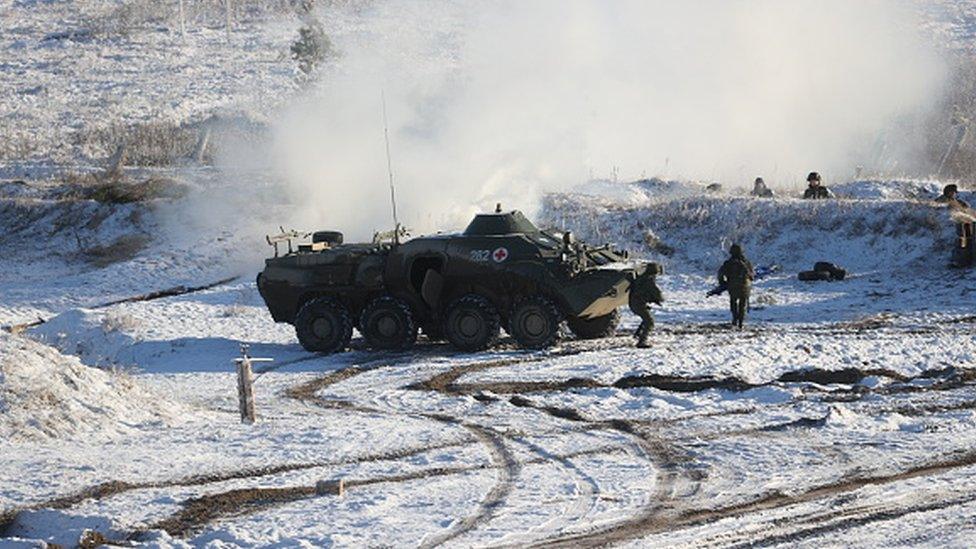
Belarusian and Russian forces took part in joint military exercises in Belarus ahead of the invasion of Ukraine
Tuesday's Belarus sanctions came as MPs approved new measures against Russia over its invasion of Ukraine.
The package includes a full asset freeze for all Russian banks, as well as new powers to limit them from clearing payments in sterling.
A ban has also been enacted on a range of exports critical to Russia's military and strategic interests.
The sanctions are in alignment with the US, European Union and others to collectively cut off much of Russia's high-tech imports, the government said.
The measures were announced by Prime Minister Boris Johnson, who told the House of Commons last week they were "the largest and most severe package of economic sanctions that Russia has ever seen".
Labour and Conservative MPs have called on the government to strengthen the sanctions regime in order to put further pressure on Russia.
Labour shadow foreign minister Stephen Doughty urged ministers to "go even faster and further", warning in some cases the sanctions had been "off the pace" compared with the UK's allies.
Conservative former cabinet minister David Davis said action was needed against the "140 or so oligarchs" identified as having "direct links" with President Putin.

Russia attacks Ukraine: More coverage
THE BASICS: Why is Putin invading Ukraine?
OLIGARCHS: Who is not on the UK sanctions list?
YOUR QUESTIONS: Could the fighting spread across Europe?
NUCLEAR ALERT: What are the risks?
IN DEPTH: Full coverage of the conflict

- Published1 March 2022
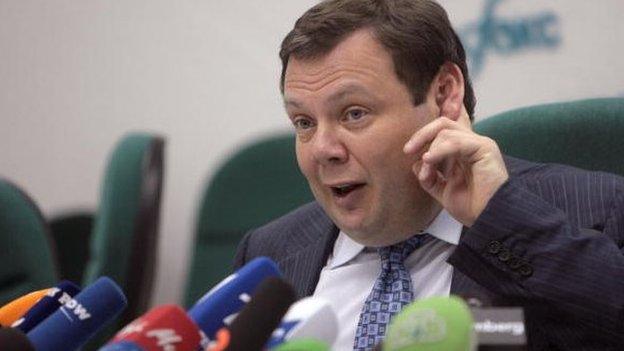
- Published1 March 2022
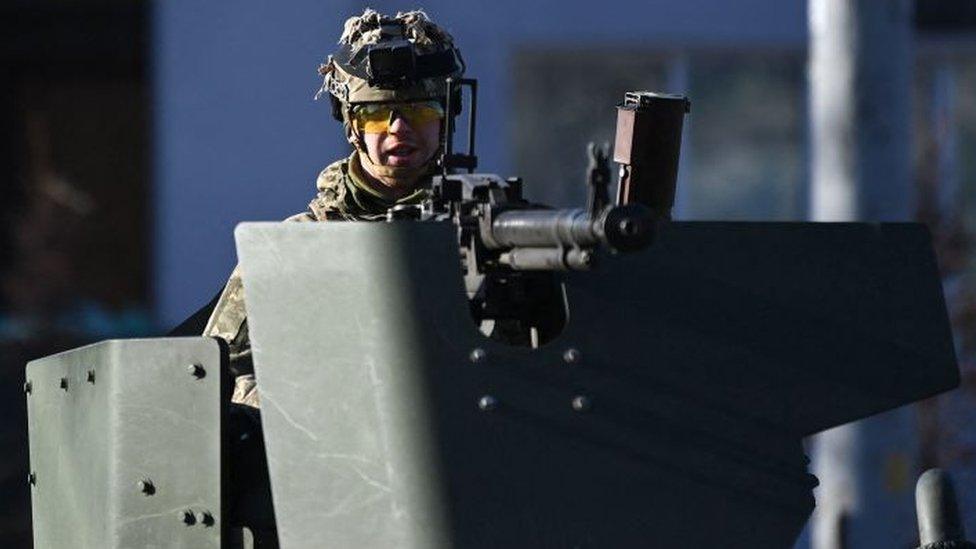
- Published28 February 2022
